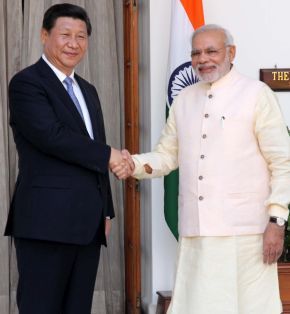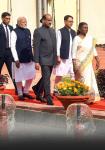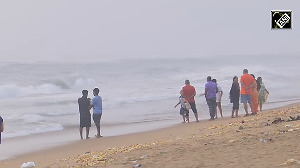 If China's behaviour in the past on ticklish issues is any indication then China could eventually support India's NSG application, says Rup Narayan Das.
If China's behaviour in the past on ticklish issues is any indication then China could eventually support India's NSG application, says Rup Narayan Das.
At a time when India's chances of getting to the high table of the exclusive Nuclear Suppliers Group seems to be round the corner, China's ambiguous attitude continues to create anxiety.
China's position is that a country like India which is not a member of the nuclear Non-Proliferation Treaty cannot be an NSG member. India has cited the example of France which became an NSG member before signing the NPT.
Given the strategic rivalry between the two countries and the China-Pakistan nexus, China's stance on the issue is understandable. While India has explained the rationale behind India's application for NSG membership, New Delhi has embarked upon diplomatic exercises to reach out to NSG member countries, hoping for a softening of China's stance.
If China's strategic behaviour in the past with regard to such ticklish issues is any indication then it can't be ruled out that China eventually may support India's application, particularly at a time when more and more countries have started extending support to India.
One can cite, if not many, at least a few, instances of Chinese strategic behaviour, when it subsequently changed its rigid stand including on India's nuclear policy.
China didn't recognise India's sovereignty over Sikkim till 2003. It was during Prime Minister Atal Bihari Vajpayee's visit to China that Beijing recognised Sikkim as an integral part of India.
China continued the practice of stapled visas for Indian citizens from Jammu and Kashmir and Arunachal Pradesh.
When Prime Minister Manmohan Singh travelled to Sanya, China, to participate in the BRICS summit in April 2011, the Chinese embassy in New Delhi issued proper visas dispensing with the practice of stapled visas to journalists from Jammu and Kashmir.
Since then, it has not reversed the policy, although it continues with the practice of stapled visas to Indian citizens from Arunachal Pradesh.
China criticised India's nuclear tests and tried to obstruct the waiver of the India-US nuclear deal at the NSG in Vienna in September 2008. Later it extended its support at the behest of the United States, when US President George W Bush telephoned Chinese President Hu Jintao.
Earlier, in January 2008, when the two countries signed the Vision Document, the two sides pledged 'to promote bilateral cooperation in civil nuclear energy, consistent with their respective international commitments, which will contribute to energy security,' anticipating the inevitability of fruition of the India-US nuclear deal.
It is against this background that President Pranab Mukherjee during his visit to China last month pleaded that like many developing countries India suffered from an acute energy shortage.
The President emphasised that as India expands power generation, India also has to be mindful of climate change.
He requested Chinese President Xi Jinping for his personal intervention for Chinese support for India's NSG application. In a very thoughtful manner, he recalled India's constant public support through the 1960s and the 1970s for China's admission to the UN Security Council.
It was a clear signal to China for its support to India's bid for NSG membership. As India's then foreign minister Mukherjee played a critical role when a waiver was sought for the India-US nuclear deal at the NSG's Vienna meeting in 2008.
It is indeed a hazardous guess if China will rescind its stance on the issue, particularly in the context of the present comprehensive engagement between the two countries, when both nations are connected in a web of bilateral and multilateral institutional framework like BRICS, the Shanghai Cooperation Organisation, the Asian Infrastructure Bank, besides the bilateral trade and investment in each other's country.
While the BRICS Bank is located in Shanghai, its current chairman is India. India will host the BRICS summit in Goa in October.
Finance Minister Arun Jaitley will travel to China later this month to participate in the AIDB's annual board of governors meeting. Prime Minister Narendra Modi is travelling to Russia to participate in the Shanghai Cooperation Organisation meeting on June 23-24, where he will meet President Xi. The SCO coincides with the crucial NSG meeting in Seoul.
China has to take cognisance of all these while taking a decision with regard to India's application for NSG membership. Diplomacy always banks on hope. India expects China to soften its stance on India's membership of the NSG.
Rup Narayan Das is a Delhi-based China scholar and a former senior fellow at the Institute for Defence Studies and Analyses.











 © 2024 Rediff.com -
© 2024 Rediff.com -